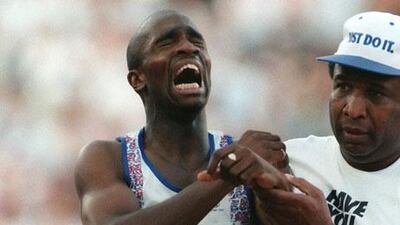They have withstood doping and Jimmy Carter and doping and the Soviet boycott and doping and corruption and doping and commercialisation and doping.
More from Chuck Culpepper
Big brothers are watching
From US football player Abby Wambach to golfer Michelle Wie, female athletes have come on leaps and bounds, thanks, in a lot of cases, to male influences.
This tournament tears down many walls. Read article
They have withstood their own garish opening ceremonies and, in many cases, their own preening leaders. They have withstood unfathomable evil and its accompanying tragedy.
They have withstood all manner of the wretchedness of human life plus beach volleyball, and somehow, in 2011 racing toward 2012, the Summer Olympics retain their hex upon the world.
A city as established and reputed as London is still counting down the days from 500 electronically in Trafalgar Square. A city as ancient as Beijing still gauges itself by the Games it hosted and a president as revered as Luiz Inacio Lula da Silva still sobs upon the selection of Rio de Janeiro for 2016.
Clearly they possess some uncommonly plucky trait, and clearly that trait must be paramount, so maybe we could say they reign as ultimate theatre.
They, like all other sporting events, exceed theatre in that no viewer knows how the story will play out but, unlike any other sporting event, transpire with multiple plots teeming in a global auditorium.
Their theatre plays out in towering moments, in clinging controversies and in inspiring biographies.
If a concept sought moments to help sustain itself, it could not yearn for better than Antonio Rebollo, the Paralympic archer, lighting the Barcelona torch with a fired arrow, Jesse Owens winning gold medals in front of Adolf Hitler, Greg Louganis winning gold after banging his head against a diving board. It could do no better than the astonishing one-upmanship of Naim Suleymanoglu lifting weights against Valerios Leonidis in Atlanta 1996.
It has had Olga Korbut and Nadia Comaneci dazzling viewers with new concepts of elegance, Ian Thorpe somehow catching Gary Hall Jr in a jaw-dropping swimming relay, Vitaly Scherbo moving masterfully from apparatus to apparatus collecting gold.
Michael Phelps coming like a force of aquatic nature to touch the wall just a smidgen of a fingertip ahead of Milorad Cavic. Cassius Clay winning gold at Rome 1960. Daley Thompson winning the decathlon at Moscow 1980 and at Los Angeles 1984. The Ethiopian Abebe Bikila becoming the first African gold medallist at Rome 1960 by winning the marathon, barefoot.
A marvel in Cuba's Alberto Jantarina in the 400 metres and 800m at Montreal 1976. A "Dream Team" at Barcelona 1992.
Even dating back to pre-television, it had the Finn Paavo Nurmi winning the 1,500m and the 5,000m within 90 minutes of each other at Paris 1924, the American Jim Thorpe becoming the greatest athlete in the world at Stockholm 1912, the Italian waiter Dorando Pietri falling five times in the marathon in London in 1908 before somebody helped him over the line to win and before he became disqualified.
Speaking of disqualified, it had Ben Johnson's 9.79 seconds, a marvel to the eyes before everyone knew how-and-why.
In their own odd way, controversies nourish chatter and add to the theatre, and so there was Johnson, the subject of the splashing news days on. The gymnastics scoring fiasco at Athens 2004. The boxing scoring flap at Seoul 1988. The Soviet Union-United States basketball everything flap at Munich 1972. The Summer Olympics have had Tommie Smith and John Carlos raising their black-gloved fists and bowing their heads on the medal stand to oppose racism at Mexico City 1968, Mary Decker and Zola Budd colliding in the 3,000 metres at Los Angeles 1984, Hungary and the Soviet Union at warlike water polo at Melbourne 1956.
And then, somehow, the Summer Olympics make a peerless platform for perseverance, be it from the elite, the upstart or the straggling.
They have seen Cathy Freeman run through the impossible weight of an expectant country for the world's most emotional 400m in a roaring stadium at Sydney 2000, Owens excel through untold pressure in front of Hitler at Berlin 1936, Wilma Rudolph peak with three golds at Rome 1960 after polio as a child, Hicham El Guerrouj, the great Moroccan runner, forget his luckless Olympic past for two golds at Athens 2004.
Kerri Strug has gone over a vault with a leg broken. Far more amazingly, an Iraq football team has gone to the semi-finals with a country broken. Even last place has stirred, as when a man named Jim Redmond took to the track to help his injured son Derek Redmond finish the 400m at Barcelona 1992, or when rousing cheers at Sydney 2000 greeted the way-behind finishing of the swimmer Eric "The Eel" Moussambani, whose exceedingly spare training possibilities in Equatorial Guinea made him uplifting.
Doping has lent constant headache. Puerile boycotts have drained spirit and disrupted careers such as that of one of the best female swimmers ever, the American Tracy Caulkins.
The bidding process has grown garish and even grotesque. Yet by more than enough, theatre surmounts all, and theatre plays on.
Follow
The National Sport
on
& Chuck Culpepper on

